Gochujang Tofu (Spicy Korean Braised Tofu)
These pan-fried tofu slices coated in their sticky, sweet and spicy gochujang sauce will convert any tofu-haters. Serve gochujang tofu as a side dish or a vegan main with white rice, surrounded by Korean banchan.
Spicy gochujang tofu is a delicious Korean side dish or an easy plant-based main meal.
The sweet and spicy gochujang sauce clings to pan-fried tofu slices for a flavour-packed gochujang tofu dish that’s ready in less than 30 minutes.
Serve it with steamed white rice, a generous helping of kimchi and sesame broccoli for a quick gochujang tofu rice bowl. Finally, sprinkle your tofu bowls with sliced green onion and sesame seeds, and you have an easy dinner that brings home the flavours of Korean cuisine
This spicy tofu recipe is super easy to make, uses only one pan and is utterly delicious – sure to convert all the tofu haters out there.
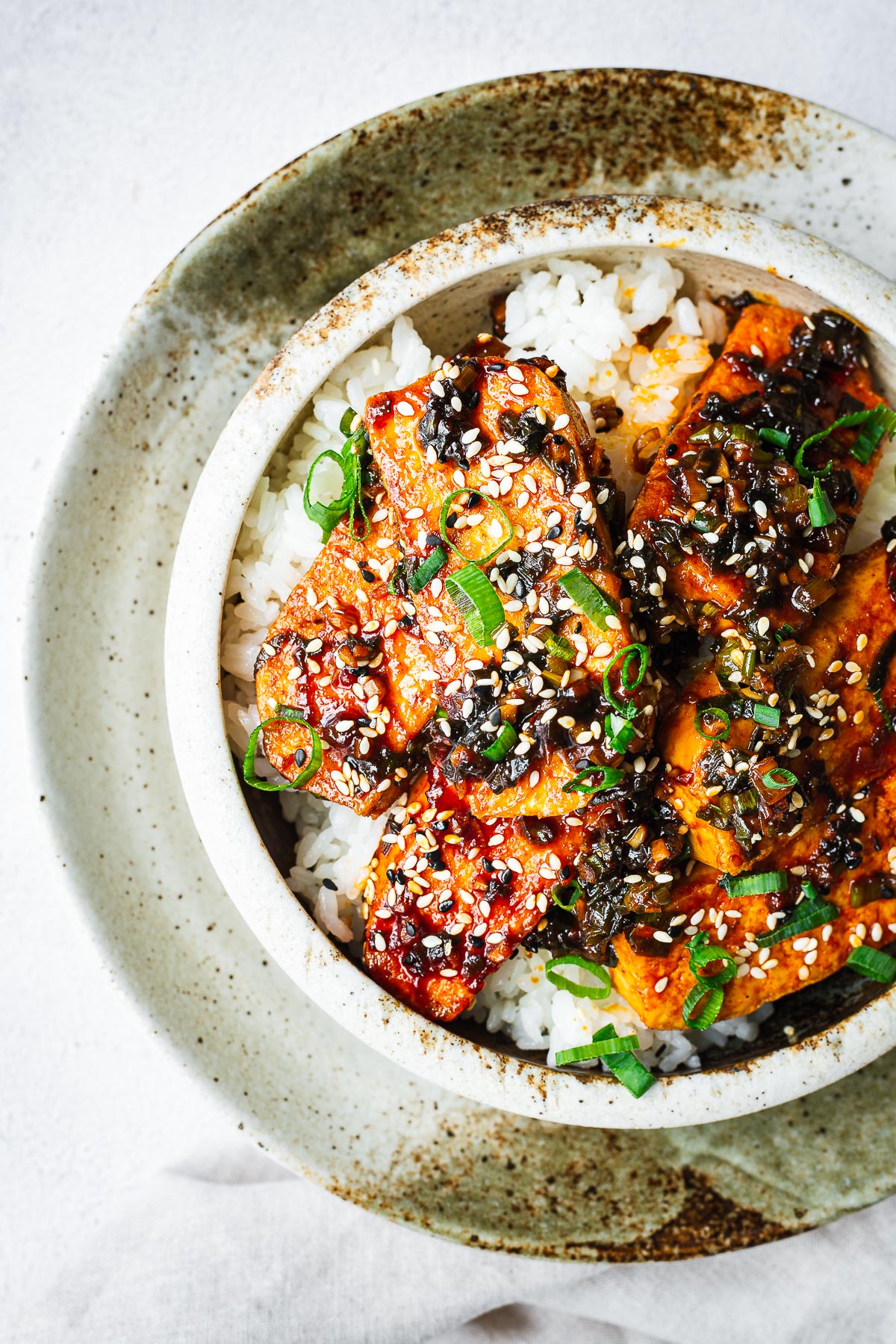
What is gochujang?
Gochujang is a spicy Korean fermented red chilli paste. It has a deep red colour with an intensely savoury, sweet, spicy, and almost smoky taste.
The chilli paste is available in different levels of spiciness: Mild, Slight Hot, Medium Hot, Very Hot and Extreme Hot. I like my gochujang medium hot.
While you can find gochujang at most grocery stores nowadays, you can also make an easy gochujang substitute from miso paste, Korean chilli powder, maple syrup, soy sauce and rice vinegar. Or if you require a gluten-free alternative, mix tomato paste with tamari and maple syrup.
Read more about gochujang, how to use it and what you can use as a substitute for gochujang if you’ve run out.
Ingredients & substitutions
The main ingredient in this gochujang tofu recipe is, of course, tofu.
When pan-frying tofu, it is best to use extra-firm tofu for crispy tofu pieces. But firm tofu will also work. Just avoid silken tofu or soft tofu (try this raw silken tofu recipe instead if that is what you have).
Firm tofu can withstand pan-frying and flipping, and the outside crisps up beautifully once you get rid of the excess moisture.
I use canola oil to pan-fry the tofu, but you can use any vegetable oil or another neutral oil.
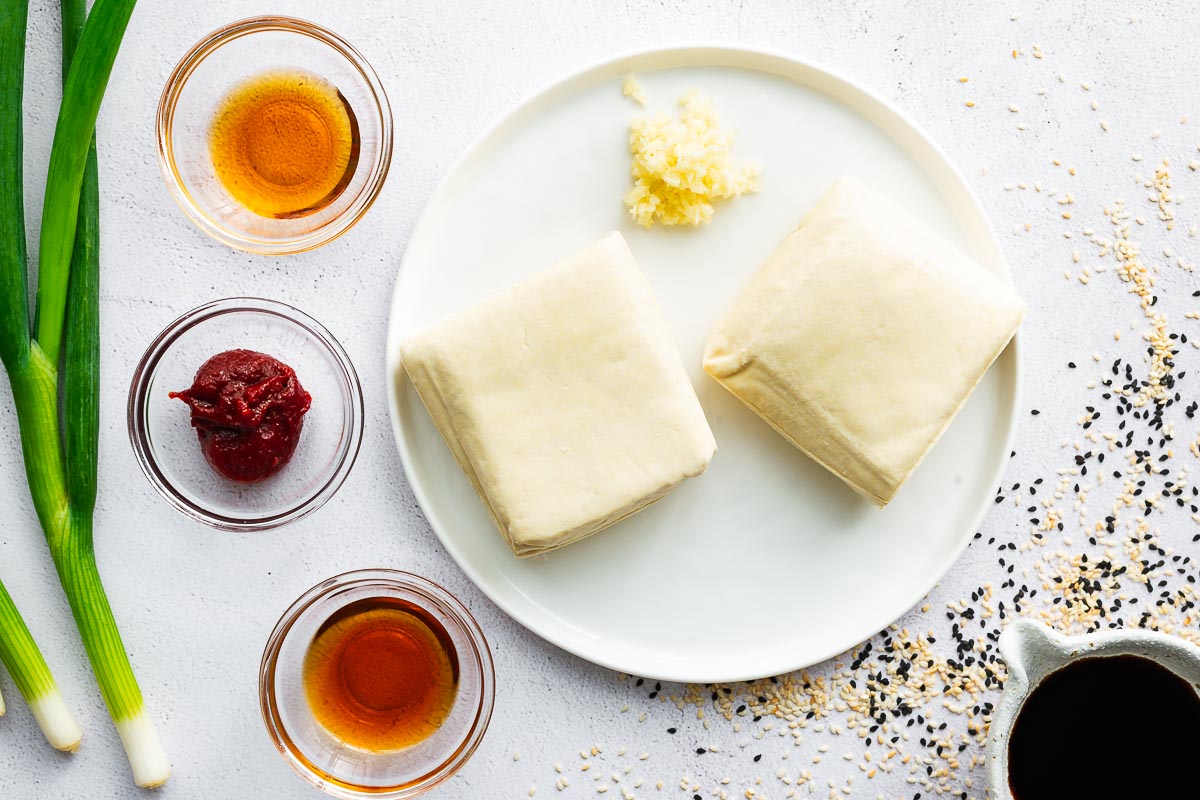
Gochujang sauce ingredients
- Soy sauce: Use regular soy sauce, like Kikkoman. But light soy sauce also works well. Just avoid the much stronger dark soy sauce.
- Gluten-free substitute: You can use any gluten-free soy sauce alternative, like tamari or coconut aminos.
- Toasted sesame oil: Make sure you use toasted sesame oil. It adds a delicious nutty flavour to the spicy, savoury sauce.
- Gochujang: I braise the pan-fried tofu slices in a sweet and spicy gochujang sauce. Gochujang is not gluten-free.
- Substitute: You can substitute the tablespoon of gochujang with a teaspoon of gochugaru or fine chilli flakes if you need it to be gluten-free. See best gochujang substitutes for more complex substitute ideas.
- Maple syrup: I adore the smoky sweetness of maple syrup. It works well with the sweet and savoury gochujang and attributes stickiness to the final tofu coating.
- Substitute: Use brown sugar or any other sweetener. You can also omit it if you need to.
- Garlic: Minced garlic adds a deliciously savoury punch to the sauce, so I add three standard-sized garlic cloves (roughly 15 grams). While not traditional, grated ginger is also a delicious addition.
- Green onions (scallions): You can also use finely diced shallots or spring onions.
Read more about substituting gochujang or gochugaru in Korean cooking:
How to make braised gochujang tofu
This Korean-inspired gochujang braised tofu is a simple dish that dirties only one pan and is ready in less than 30 minutes. It’s the perfect quick-and-easy vegetarian dish for a weeknight meal!
Step 1: Prepare the tofu
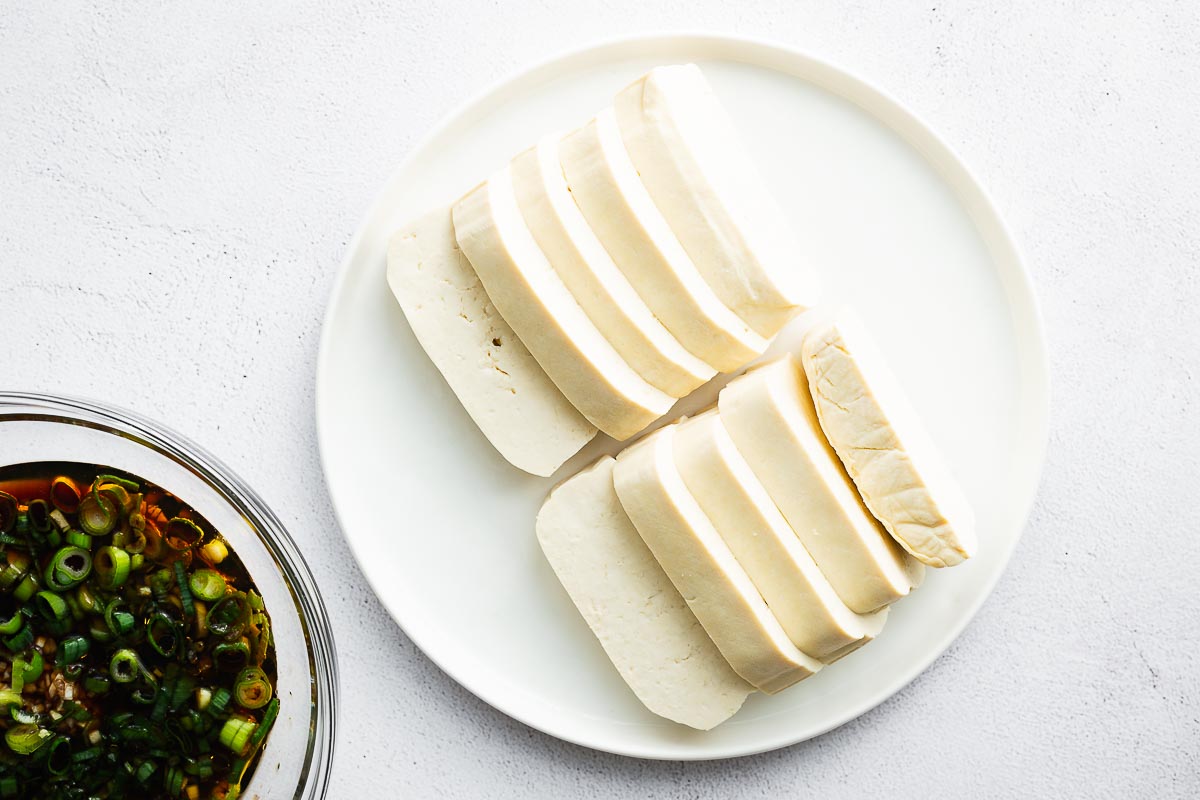
Take your firm tofu block and gently press out as much water as possible over the kitchen sink. Dry tofu crisps up better.
Cut the tofu into ½ inch (1 cm) thick rectangular pieces. You can also slice it into tofu cubes if you prefer bite-sized pieces. Thoroughly pat dry the tofu slices with a paper towel.
Step 2: Pan-fry the tofu
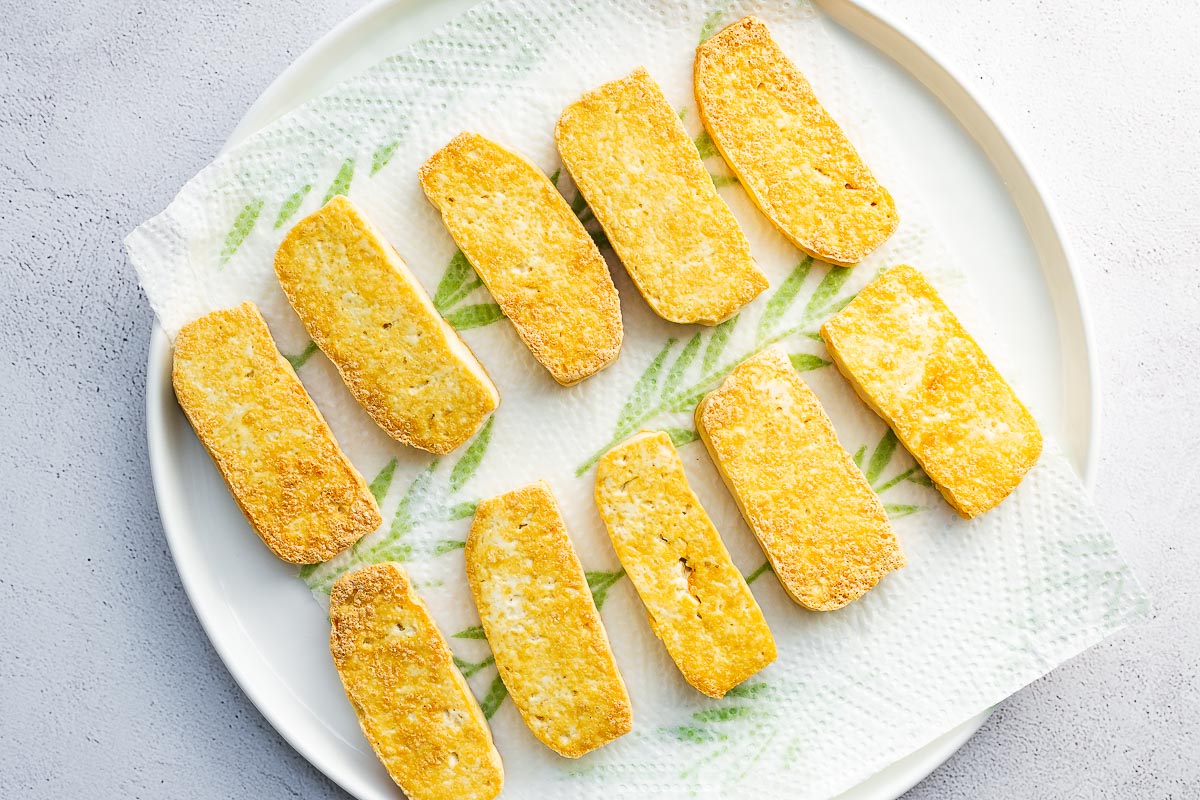
Heat a large non-stick pan or seasoned cast iron skillet over medium-high heat with a tablespoon of oil.
Once very hot, carefully add the dry tofu slices.
Fry the tofu until golden on both sides with a crispy texture, about four minutes per side.
Line a plate with paper towels and transfer the crispy tofu to the plate. The paper towel will absorb the excess oil. Set aside while you prep the sauce.
Step 3: Add the sauce
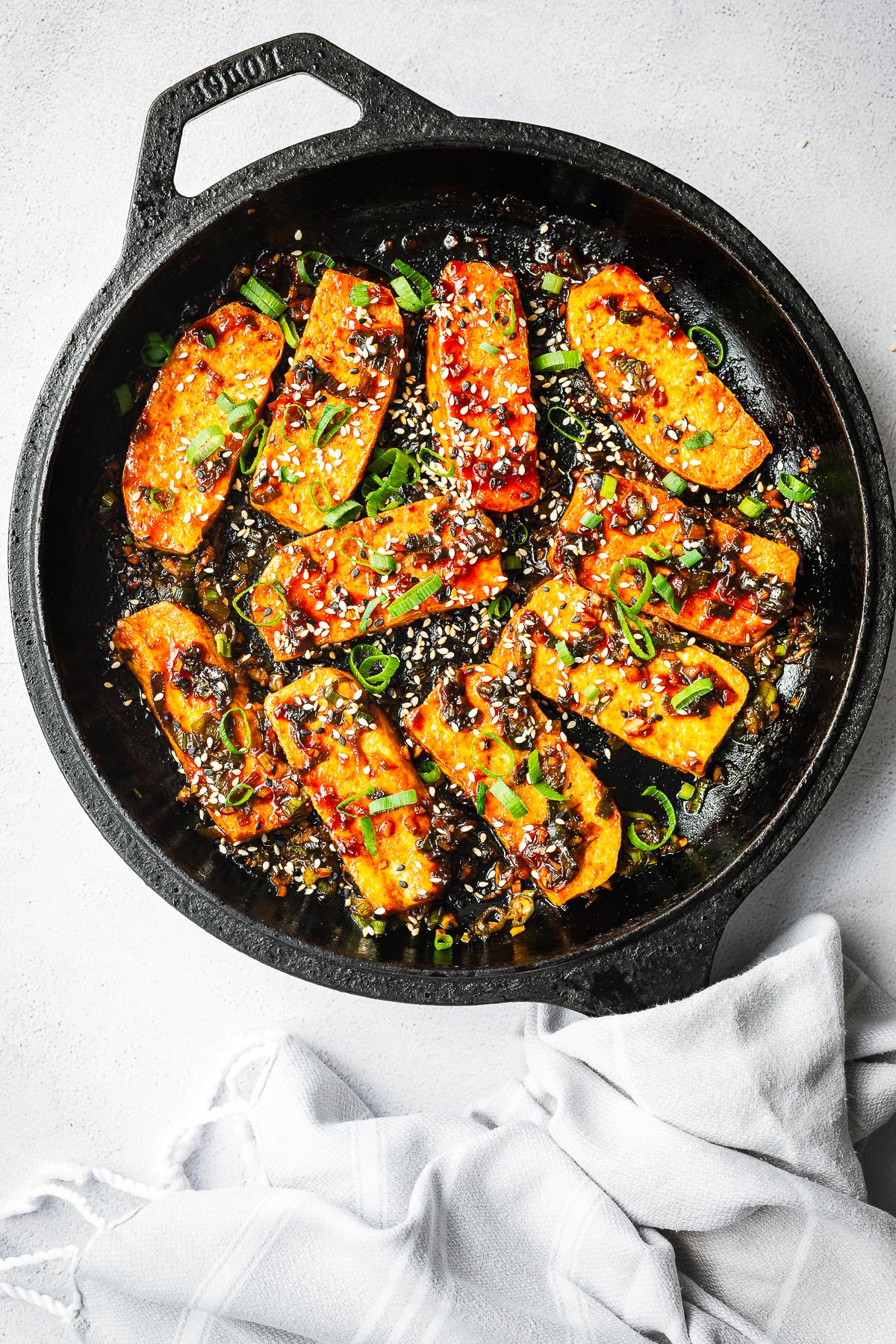
Add all of the sauce ingredients to a small bowl and whisk until well combined.
Reduce the heat to medium and carefully wipe away excess oil from the tofu cooking pan with a paper towel. Add the sauce mix and stir for a minute.
Saucy tip: The sauce reduces until it coats the tofu in a beautiful glaze. But you can double the sauce recipe if you want some extra gochujang sauce to drizzle over your rice.
Step 4: Braise the tofu in the sauce
Return the tofu to the pan with the sauce. Simmer for four minutes over medium heat.
Gently flip the tofu pieces and simmer for another minute, spooning the sauce over the tofu rectangles.
Sprinkle with the reserved green onion and sesame seeds.
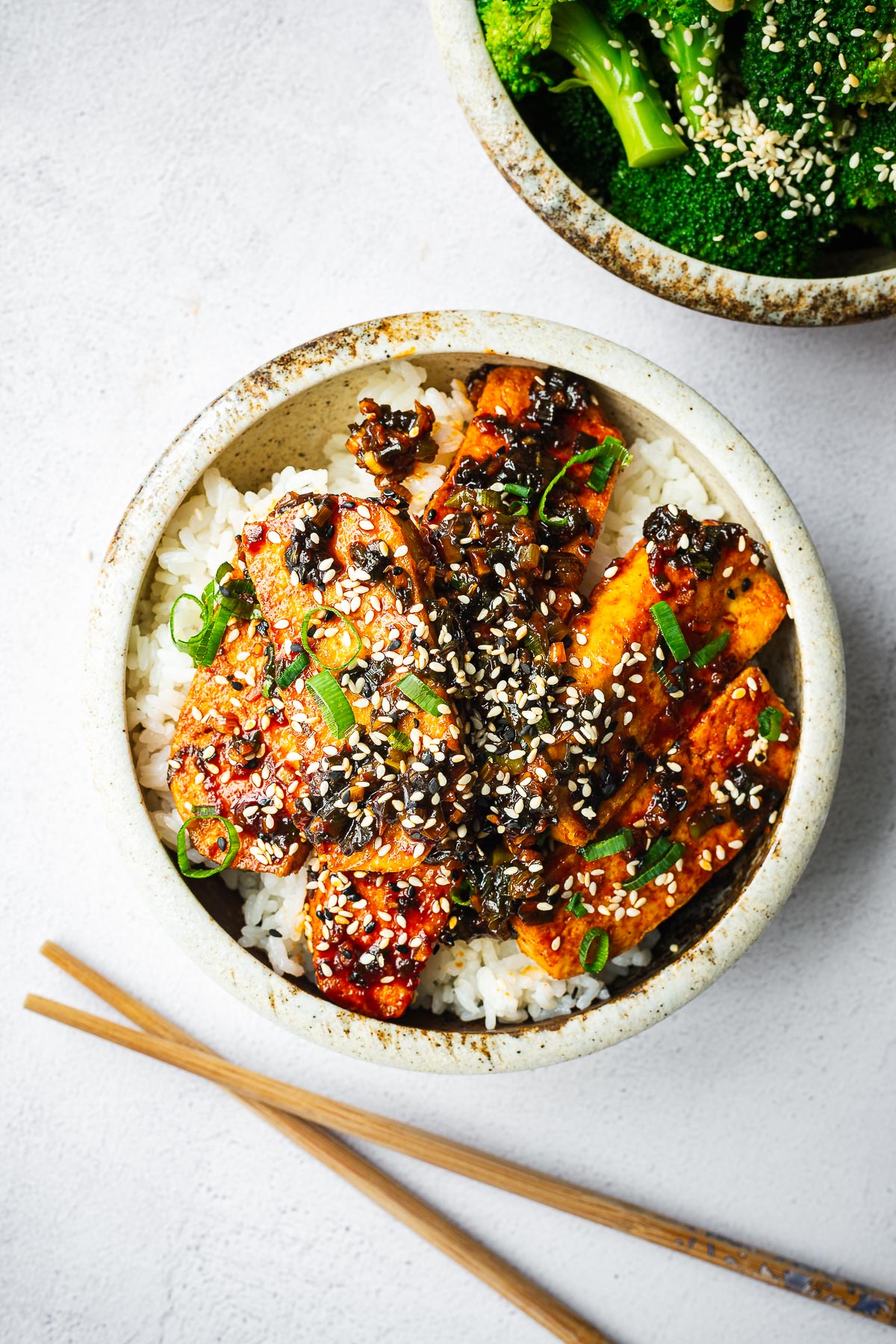
Serving suggestions
Spicy braised tofu is a traditional Korean side dish. But I also serve this version with its sweet and spicy sauce as a vegan gochujang tofu main course surrounded by more Korean dishes.
For an easy weeknight dinner, serve gochujang tofu with popular banchan like:
- kimchi,
- spicy cucumber salad,
- sesame broccoli salad or bok choy,
- green onion salad,
- soy-braised potatoes,
- and, of course, short-grain rice (try this easy stovetop short-grain rice recipe or this Instant Pot sushi rice recipe).
Frequently asked questions
Gochujang is a fermented Korean red chilli paste. It is not served as a condiment on its own but forms the base of other condiments (like ssamjang), sauces (like gochujang mayo) and other dishes (like gochujang stew and gochujang fried rice).
Gochujang is available in different levels of spiciness: Mild, Slight Hot, Medium Hot, Very Hot and Extreme Hot.
Yes, gochujang is typically vegan. It typically contains fermented soybeans, red pepper, rice, and salt.
Korean braised tofu is a popular side dish of seared tofu slices simmered in a spicy braising liquid. The braising liquid traditionally includes chilli powder, sesame oil, soy sauce, sesame seeds, scallions (green onions), garlic and sugar.
Try more recipes with gochujang
- Spicy Korean gochujang noodles
- Gochujang fried rice with kimchi
- Homemade bibimbap sauce
- Gochujang mayo
- Spicy gochujang eggs (perfect on toast or rice)
More about my favourite secret ingredient gochujang and how to use it.
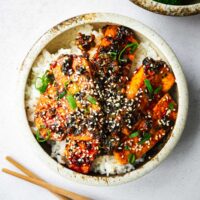
Equipment
- Skillet – I use a well-seasoned 10.25-inch Lodge cast iron skillet, but a nonstick frying pan also works well.
Ingredients
- 18 ounces extra-firm tofu
- 1 tablespoon canola oil, or vegetable oil
Spicy gochujang sauce
- 3 tablespoons water
- 2 tablespoons regular soy sauce, or light soy sauce
- 1 tablespoon toasted sesame oil
- 1 tablespoon gochujang paste, or 1 teaspoon gochugaru (Korean chilli powder)
- 2 teaspoons maple syrup, or sugar
- 3 cloves garlic, minced
- 2 green onions, finely sliced (reserve some for garnish)
To serve
- 2 tablespoons toasted sesame seeds
- reserved green onion
Instructions
- Take the tofu block between your hands and gently press out as much water as possible over the kitchen sink. Cut the tofu block into thick rectangular pieces – about ½ inch (1 cm) thick. Thoroughly pat it dry with a paper towel.
- Grab a small bowl and whisk together the gochujang sauce ingredients.
- Heat a large non-stick pan or seasoned cast iron skillet over medium-high heat with a tablespoon of oil. Once very hot, gently add the dried tofu slices.
- Pan-fry the tofu until lightly golden brown on both sides, about four minutes per side.
- Line a plate with paper towels and transfer the golden tofu to the plate, allowing the paper to absorb the excess oil.
- Reduce the heat to medium and carefully wipe away the excess oil with a paper towel. Add the gochujang sauce mix to the pan and stir for a minute. Return the tofu to the pan with the sauce.
- Simmer for four minutes over medium heat. Gently flip the tofu pieces and simmer for another minute, spooning the sauce over the tofu rectangles.
- Sprinkle with the reserved green onion and sesame seeds.
Notes
- Use more oil to fry the tofu if your pan is not non-stick and carefully wipe out excess oil before adding the sauce ingredients.
- The sauce reduces until it coats the tofu in a beautiful glaze. You can double the sauce recipe if you want extra sauce to drizzle over your rice
- Gochujang and chilli flakes come in varying degrees of spiciness. I use medium-hot gochujang, and the one tablespoon makes the sauce plenty spicy. Adjust the sauce with extra chilli flakes or more gochujang paste according to your preferred spice level. Or try a gochujang substitute.
- Find more ingredient and substitute information.
More Korean recipes you may like
If you like this lemon tahini sauce, you might also like these tahini dressings and sauces


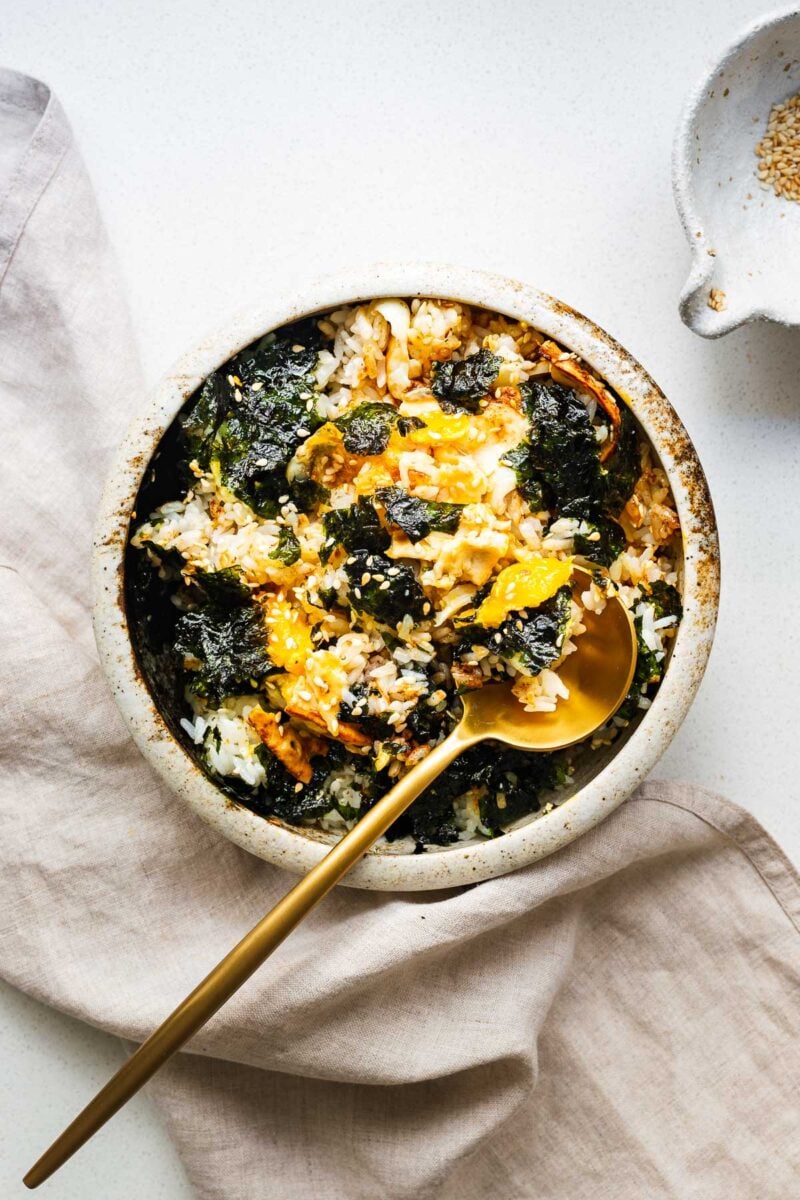

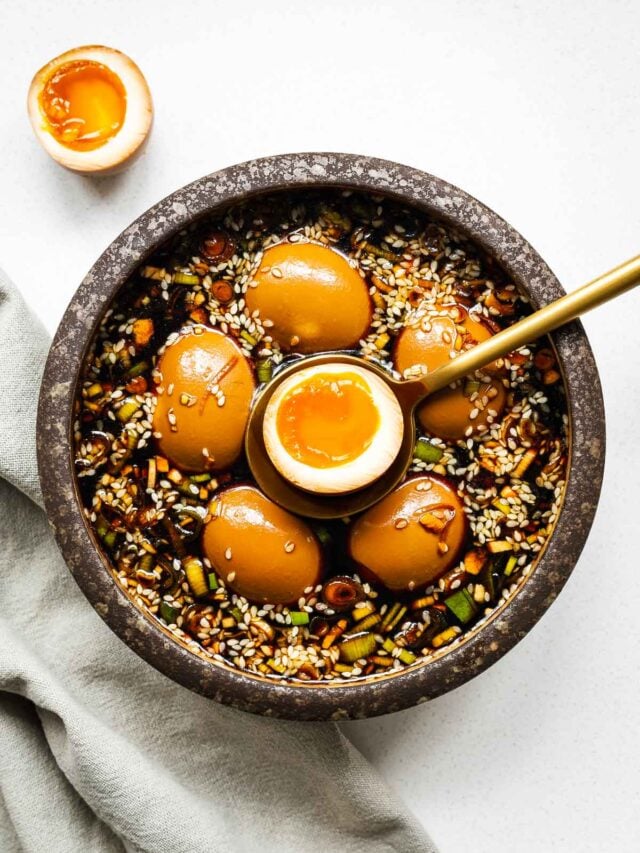
Love love love it! I typically make crispy tofu in gochujang sauce, but this was even better! Great recipe!
Thank you so much, Ieva! I’m so happy you enjoyed the recipe!
This braised tofu recipe was so easy and super flavorful! Thank you!
I’m so happy you enjoyed it, Katherine! It’s still my favourite way to cook tofu.
This was an easy, tasty dinner for our family tonight! The gochujang tofu was packed with flavor, and went great alongside some rice and stir fried veggies!
I’m so happy you enjoyed it, Anjali. This is still my favourite way to cook tofu.
Totally delicious and surprisingly easy to prepare, this was a total hit and everyone loved it! Thanks so much!
I’m so glad you loved it, Heather! It is still one of my favourite ways to cook tofu!
Thisss is one of the million reasons I love tofu. Thank you for another great way to enjoy tofu! If I wanted to make with chicken do you think it would work?
Yes! This gochujang sauce is perfect to cook other proteins too! I would use chicken thighs, or cut chicken breasts into smaller slices. Then quickly sear them in the pan and finish in the sauce as you would with the tofu recipe. And, thank you for the idea… I might just make this for lunch today!